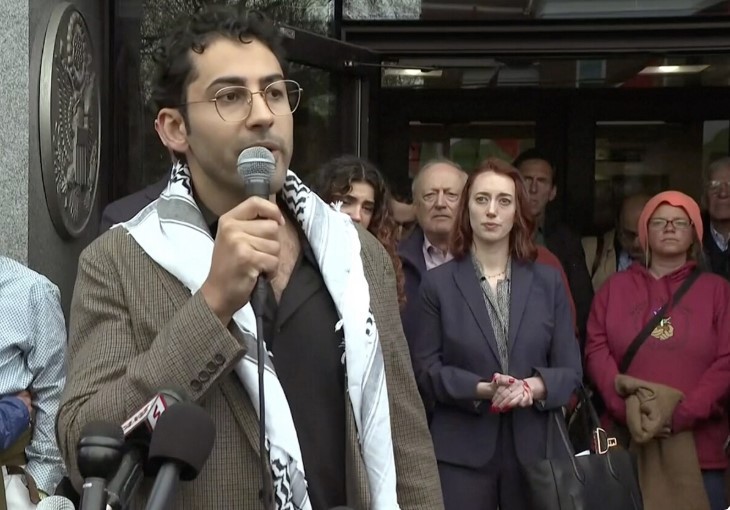Who is Alexander Back? — A Comprehensive Update on the ICE Employee Arrested in a Child-Sex Sting
 Victims in the York County Shooting: Who Are the Officers Killed and Wounded? Victims in the York County Shooting: Who Are the Officers Killed and Wounded? |
 Suspect in Charlie Kirk Killing Feared Police Would Shoot Him Before Peacefully Surrendering, Sheriff Says Suspect in Charlie Kirk Killing Feared Police Would Shoot Him Before Peacefully Surrendering, Sheriff Says |
 |
| Who is Alexander Back, ICE employee arrested in child sex trafficking sting?(Hennepin County Sheriff's Office) |
The arrest of Alexander Steven Back, a 41 year old civilian employee of Immigration and Customs Enforcement, has drawn national attention after investigators named him among sixteen men accused of attempting to solicit a minor for sex during a three day law enforcement sting known as Operation Creep. The case stands out not only because of the nature of the allegations, but also because the suspect worked for a federal agency linked to immigration enforcement.
The investigation continues to unfold, and new information has sharpened the public’s focus on how the sting worked, who Back is, and what legal consequences he may face. This article provides a clear and complete update built for readers who want verified facts, context, and search ready details.
Who Is Alexander Steven Back?
Before his arrest, Alexander Back worked as a civilian auditor within ICE. His job involved reviewing I-9 employment verification forms. He was not a sworn officer, did not carry a badge, and did not have arrest authority. He joined the agency in 2022 and was based in Minnesota.
Investigators say Back communicated with what he believed was a 17 year old girl and arranged to meet at a preselected location in Bloomington. The vehicle he arrived in was registered to his wife. Officers arrested him upon arrival and seized his phone as evidence. Reports from the arrest indicate that he identified himself as an ICE employee during the encounter.
Back’s employer placed him on administrative leave while the agency’s Office of Professional Responsibility conducts an internal review. Federal agencies routinely launch parallel investigations in cases where an employee is charged with a crime involving minors, misconduct, or abuse of trust.
What Is Operation Creep?
Operation Creep was a coordinated sting led by the Bloomington Police Department in Minnesota. It ran for three days and targeted individuals who attempted to engage in sexual activity with someone they believed to be an underage teen.
The operation used digital undercover tactics:
-
Officers posted an online advertisement.
-
When potential offenders responded, a decoy disclosed being younger than advertised.
-
If the individual continued the conversation and attempted to arrange a meeting, investigators scheduled a location.
-
Officers arrested the suspect when he arrived.
Sixteen men between 18 and 49 were arrested during the operation. Authorities say the goal was to reduce demand for commercial sexual exploitation and to identify individuals who pose risks to minors.
Law enforcement leaders have described this type of sting as increasingly complex because technology helps offenders hide their identities. Operations like this one require detailed planning across multiple agencies.
What Investigators Say Happened
According to charging documents, Back responded to the undercover ad and continued messaging after being told he was speaking with someone younger than the ad stated. The complaint says he acknowledged the age disclosure and still agreed to meet.
Upon arrival at the meeting location, officers surrounded his vehicle and arrested him. Authorities say he did not resist. Evidence gathered at the scene included his mobile phone, which investigators believe contains the digital communication records central to the case.
After booking, Back was held at Hennepin County Jail before being released on a seventy five thousand dollar bond pending further court proceedings.
The Charges Against Back
Back faces a felony charge for hiring or agreeing to hire someone he believed to be a minor between sixteen and eighteen for sexual activity. In Minnesota, this charge carries significant penalties that may include jail time, fines, and mandatory registration depending on the outcome.
Back has not yet entered a plea. His next court hearing is scheduled for December 17, where the court may discuss additional evidence, pretrial conditions, or a potential plea timeline.
Legal experts note that cases involving digital communication can hinge on text logs, intent, and whether the suspect had reason to believe the person was under eighteen. Prosecutors typically rely heavily on message transcripts and undercover officer testimony.
ICE’s Response
ICE moved quickly after the arrest became public. The agency placed Back on administrative leave and issued a statement confirming that he held a civilian role, not a law enforcement position. ICE also stated that it does not tolerate criminal activity by its employees and that it is cooperating fully with local authorities.
Internal reviews within ICE often run parallel to criminal cases. Depending on the findings, outcomes can include reassignment, suspension, or termination. The separate internal process does not replace the criminal justice system.
Why This Arrest Drew National Attention
The case gained traction for several reasons:
A federal employee facing child solicitation charges.
Any crime involving a minor raises urgent concern, and the fact that Back worked for a federal enforcement agency amplified public scrutiny.
Growing focus on online exploitation.
Law enforcement leaders consistently warn that online platforms have become fast moving spaces where minors are vulnerable and predators can disguise their identities. Sting operations highlight this risk.
A broader pattern of proactive operations.
Operation Creep follows a national trend of stings aimed at reducing demand for underage prostitution and trafficking. These operations are often used to detect first time offenders who may not have previous criminal records.
Public trust concerns.
Cases involving public employees, especially those connected to federal agencies, often spark debate about hiring standards, internal screening, and oversight.
Potential Legal Outcomes
Back’s case may follow one of several paths:
-
Plea agreement.
Many solicitation cases end in negotiated pleas, sometimes with reduced charges depending on cooperation and evidence strength. -
Trial.
If no agreement is reached, the case may proceed to trial where investigators would present transcripts, testimony, and digital forensic evidence. -
Federal involvement.
While not guaranteed, local authorities indicated that some cases from the sting could be referred to federal prosecutors if evidence overlaps with federal jurisdiction. -
Employment consequences.
Independent of the criminal case, ICE may impose its own disciplinary measures.
Until the December hearing, Back remains free on bond under pretrial conditions.
Impact on Community and Policy
Operation Creep reflects a broader push within Minnesota law enforcement to disrupt child exploitation. Local officials say demand reduction is a critical part of prevention because it targets individuals who actively seek minors online. The sting also highlights challenges officers face as offenders adapt to changing technology.
Community advocates argue that these operations serve as visible deterrents and bring necessary public attention to the risks minors face. They also emphasize the need for ongoing education, digital safety programs, and cooperation between government agencies.
Conclusion
The arrest of Alexander Steven Back during Operation Creep has raised serious questions about online safety, institutional accountability, and the responsibilities of federal employees. As the case moves toward its next court date, more information is expected to surface about the evidence, internal reviews, and what consequences Back may face.
This case reinforces a central message that law enforcement continues to repeat: anyone who attempts to exploit minors, regardless of profession or position, risks significant legal and social consequences. The investigation remains ongoing, and public interest is likely to remain high as the legal process continues.
Frequently Asked Questions
Who is Alexander Back?
He is a 41 year old civilian employee of ICE who worked as an I-9 auditor. He had no law enforcement authority.
Why was he arrested?
He was accused of attempting to solicit a minor during Operation Creep, a three day law enforcement sting in Minnesota.
What is Operation Creep?
A targeted undercover operation aimed at identifying individuals who attempt to buy sex from someone they believe is underage.
What charges does he face?
A felony count for hiring or agreeing to hire someone he believed was under eighteen for sexual activity.
Is he still employed by ICE?
He is currently on administrative leave pending an internal investigation.
What happens next in the case?
His next court hearing is scheduled for December 17, where legal proceedings will continue based on the evidence gathered.
Could his case go federal?
It is possible, depending on how prosecutors assess the evidence, although no formal federal charges have been announced.
























